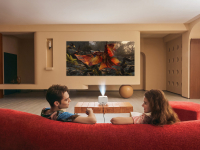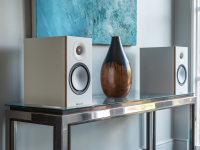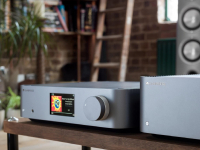
As we’ve mentioned in a number of recent blog posts, mini-systems are currently in the midst of a long-overdue revival. With manufacturers once again shining a light on this somewhat unloved branch of the Hi-Fi family, sprucing up products with the latest technology, the humble mini-system is ready to stake its claim as a serious home listening option…
With this in mind, it is the perfect time to look at one of the longest serving Hi-Fi houses, Yamaha, and their all new CRXN470! Incorporating a number of streaming options, as well as more traditional methods of playback, the ’470 (as we’ll call it from here on out!) is Yamaha’s attempt to take on the likes of Marantz and their MCR611, as well as Denon’s RCDN9. How will it hold up against these two impressive machines? Let’s find out!
First impressions of the Yamaha are good, with the same fairly minimalist, retro stylings of its full-size separates range also used here on the ’470. Coming in a similar size case to the Marantz and Denon mentioned above, the ’470 is larger than some cheaper options, such as Denon’s DM40, that come in at lower price points. This more substantial casework allows the display to be less cluttered, which coupled with the already minimalist layout makes for an easy to use front panel.
The ’470 is fairly light for its size, especially when compared to something like Cambridge’s One system. This is primarily due to Yamaha’s use of digital amplification, which is built around a chip, and doesn’t use a large power supply like that found in the Cambridge. There are pros and cons to both designs, with digital amplifiers offering greater energy efficiency, but losing out in terms of overall distortion levels when compared to more traditional amplifiers. The implementation here worked well, with the reasonably low output of 22WPC into a 6 ohm load still providing enough drive for our DALI Zensor 3 demo speakers to high levels without sounding harsh and shouty as the volume went up.
Where the ’470 really shows its teeth is in its range of connections, both wireless and physical. With Bluetooth, AirPlay and built-in Wi-Fi, the Yamaha is pretty much a dream machine for anybody looking to play music wirelessly. Yamaha’s own MusicCast controller app allows users to play music across a home network, or from services such as Spotify, Qobuz or Napster. Bluetooth and AirPlay offer similar functionality for those who want to play directly from their mobile device, with AirPlay perfect for playback from Apple devices, and Bluetooth ideal for Android devices or laptops. In an even neater little touch, the Bluetooth can work both as input AND output, allowing owners of Bluetooth speakers or headphones to listen wirelessly to what the Yamaha is playing back. A truly 21st century system!
Those still clinging to the 20th century (you’re not alone!!) are catered for, too, with CD playback a standard, and a DAB and FM tuner also included. A set of RCA and 3.5mm inputs are also featured, whilst a USB socket rounds things off. Headphone listeners that want to stick to the more traditional cabled variety are provided with a 1/4″ socket on the front fascia.
The only other thing of note before we crack on to our listening results is that the system takes advantage of Yamaha’s MusicCast software and hardware. Yamaha’s take on multi-room listening, MusicCast allows compatible Yamaha products to wirelessly link to each other, meaning that the same music can be played in separate rooms of the house at the same time. Anyone thinking of going down this route – a very popular option in the past few years – will find another big plus for the ’470 when choosing a mini-system.
As mentioned previously, our listening was mainly performed with the DALI Zensor 3 standmount speakers. A reasonably large design, the Zensor 3 proved a solid match for the Yamaha’s sonic signature, giving a well balanced sound that started with deep and plentiful bass, lush mids and a crisp but forgiving top end. Despite its reasonably low power output, the Yamaha was able to drive pretty much anything we threw at it to high levels.
Kicking things off with Radiohead’s A Moon Shaped Pool (for a change!) gave us an easy way to compare the Yamaha’s performance from the off. You should always choose demonstration music you’re familiar with, and few albums are more familiar to us at this point than this latest release from the Oxford quintet. On an album full of brilliant, sonically jam-packed tracks, Glass Eyes, a gorgeous piano driven song offers one of the record’s quietest, but most beautiful, moments. The Yamaha presented it nicely, with the rippling piano chords and melancholy strings of its opening seconds all present and correct. Yorke’s vocal was easy to follow, and its separation from the instruments around him was very good, giving a sense of space to this purposely shut-in track.
Moving on to Internet radio via the TuneIn app played over Bluetooth, the ’470 showed it was able to keep up with something a bit punchier, too. Deepvibes Radio, a popular post-work choice in the Liverpool store come Saturday night, is a 24-hour a day home to quality Deep House tracks and DJ sets, all broadcast in a high bit-rate and with no adverts! The Yamaha and DALI combo kept time brilliantly here, with the sound having enough edge to keep toes tapping away. Bass was deep, filling our average-sized listening room nicely, with very little sense of overhang to ruin the sense of pace. When set up head-to-head with the Cambridge One, the Yamaha did lose a little bit in terms of finesse and control, with the music seemingly taken more in its stride through the One, particularly when we increased the volume to “the neighbours are out for the day!” levels, but on the whole, performance was very good.
Given that the Cambridge doesn’t offer Wi-Fi or AirPlay connectivity, this made for something of a stand-off in our eyes. The Yamaha was a good enough performer not to be stomped on by the marginally better Cambridge, and it adds a fair few methods of connectivity that the One can’t match it for. Even in the face of stiff competition from the Marantz and Denon models, the Yamaha held its own, giving a solid performance across a range of genres.
Our best advise would be to listen to as many of the bunch as you can, but on its own merits, the Yamaha CRXN470 proved to be an excellent system, and definitely a welcome return from Yamaha in the category. Recommended!
Shop for mini systems with Richer Sounds.
Chris, Liverpool store







